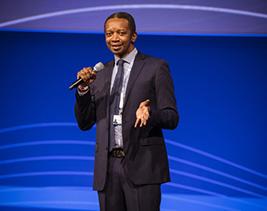Expert Voices
The future of a fair and just digital world

As the Internet Governance Forum (IGF) marks two decades shaping global digital policy, the need to create an equitable online future has never been greater. This year’s Forum, held in Norway from 23 to 27 June 2025, faces complex challenges, with artificial intelligence transforming our online spaces, the ever-present digital divide and growing concerns about digital trust. Chengetai Masango, Head of Office at the IGF Secretariat, explains what’s at stake.
This year, IGF will commemorate 20 years of shaping the digital future. What are some key successes of Forum, and how can we keep this momentum to ensure the Internet is people-centred and equitable?
“Since its first annual meeting in Athens in 2006, the IGF has grown from just over 1,000 participants to nearly 11,000 in Riyadh in 2024. Today, there are 176 national and regional IGF initiatives (NRIs) – one for nearly every country and region in the world – that have emerged organically to replicate the IGF model and provide an invaluable, locally-based feedback mechanism into the global Forum.
This remarkable growth reflects increased global interest in digital governance and the importance of the IGF as an open and bottom-up platform for dialogue. Over time, the IGF has brought more voices into the conversation, particularly from underrepresented groups, youth, and the Global South, and has expanded the circle to include decision-making bodies like parliaments and judiciaries.
The Forum has remained responsive to a changing digital landscape, consistently engaging with new issues – whether AI, cybersecurity or digital fragmentation. Its structure allows it to evolve alongside technological and policy developments, while its multistakeholder model ensures that diverse perspectives are reflected in the discussion.
To maintain momentum requires strategic engagement, including the continued expansion of the IGF’s Parliamentary Track, which facilitates peer knowledge exchanges between parliamentarians and with other critical stakeholders. We need to keep engaging our youth and to cultivate their critical thinking skills online. We need to continue bringing in the marginalized. Billions remain offline, and many more lack meaningful access. Ensuring local and regional experiences inform global policy remains a key priority. The IGF can also support this work by continuing to generate action-oriented outputs and insights that impact policy, foster cooperation and improve digital inclusion.”
As frontier technologies like AI rapidly change the digital landscape, we need to build trustworthy online ecosystems. How can we make sure that our digital future is established upon integrity, security and transparency?
“Algorithmic computing has long been part of digital systems, but new developments, particularly large language models, are rapidly expanding its reach and visibility. These technologies can support progress across sectors if they are designed and used with people in mind. The focus must be on how AI systems are developed, deployed and governed in ways that uphold rights and responsibilities, and the IGF provides a space where these questions are openly debated on an equal footing by diverse stakeholders.
No single actor can tackle these challenges alone; it takes global cooperation and a multistakeholder approach. Through its Policy Network on AI (PNAI), the IGF has emphasized the importance of grounding AI governance in human rights, calling for transparency, accountability and inclusive oversight mechanisms as central to building trustworthy systems.
At the same time, trust in the digital environment has been affected by multiple factors: opaque algorithmic models, the spread of misinformation, unclear platform accountability, and growing concerns about surveillance and data misuse. Addressing these concerns requires coordinated approaches that prioritize transparency, safeguards, and public awareness.
Ultimately, making our digital future trustworthy means giving everyone a seat at the table and a role in shaping the outcome. When we work openly and cooperatively, we reinforce the values of integrity, security, and transparency online. Through collective effort and understanding, we can shape a digital ecosystem that benefits and protects all users.”
Digital technologies are already playing an integral role in addressing sustainable development challenges. What can they do to limit environmental impact and proactively promote affordability, accessibility and inclusion?
“Digital tools support sustainable development across areas such as agriculture, education, health, and disaster preparedness. They can improve efficiency, enable remote access to services and inform better decision-making through data. At the same time, digitalization has environmental costs that must be addressed, particularly the energy use of data centers, AI systems, and large-scale infrastructure. The IGF’s Policy Network on the Environment (PNE) has also drawn attention to the growing problem of e-waste, underscoring the need for sustainable product lifecycles and improved systems for reuse and recycling.
Limiting environmental impact will require stronger incentives for energy-efficient technologies. Open-source approaches can help by encouraging collaborative solutions that are less resource-intensive and better tailored to local contexts. Through its annual meeting and intersessional work, the IGF brings visibility to these concerns and surfaces good case studies from around the world.
Affordability and accessibility remain key barriers. Public infrastructure investment, local connectivity initiatives, and multilingual access are among the ways to reach more people. Inclusion must be embedded into the design of technologies so that everyone – not just those already connected – can benefit from and shape the digital future.”
Follow IGF, happening on 23-27 June 2025: https://intgovforum.org/en
 Welcome to the United Nations
Welcome to the United Nations